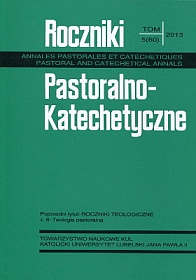Formacja permanentna w służbie rozwoju osobowości katechety
Abstrakt
Permanent formation is related to periodic formation and is understood as its extension, undertaken in order to empower the teacher to participate in contemporary religious education and its curriculum design. Therefore, the nature, the contents and the methodology of permanent formation all depend on the degree and type of educational background acquired through academic courses. The major function of the permanent formation is making the teachers capable of personal growth through enhancing the professional skills they developed during the studies. The effectiveness of religious education is not, first and foremost, dependent on the contents and methods of instruction, but on the teacher: his/her personal maturity and spiritual advancement, his acquaintance with contemporary life, his interpersonal skills and readiness to stay in dialogue with others. Rapid changes in human mentality and the deeper understanding of what religious education really is impose a challenge upon the teacher to undertake permanent formation, in both the realm of the matter and of the spirit; intellectual and methodological.
The formation of the religion teacher largely depends on his/her acquisition of declarative and procedural knowledge, but the main task they face is their becoming pro-active and empowered, so that they can see their strong points, make them even stronger and use them effectively for influencing their environment. Personal growth needs constant improvement and requires sensitivity to the need of renewal and social participation. Of utmost importance is the teacher's opening to God and to the problems of contemporary world, his/her contemplation of the Bible and active participation in the life of the Church. All these efforts should shape the religion teacher into a dynamic, pro-active person, capable of effective interpersonal contact. Otherwise, the teacher is very unlikely to be effective in his/her didactic impact. The proper understanding and profiling of the teacher's formation − which takes part in the community and through the community − ensures effective catechetical education.
Bibliografia
Alberich E.: Katecheza dzisiaj. Warszawa: Wydawnictwo Salezjańskie 2003.
Bissoli C., Soravito L.: I catechisti in Italia. Identità e formazione. Torino: Elle Di Ci 1983.
Gevaert J.: Proposte per la formazione dei diversi tipi dei catechisti. W: La formazione dei catechisti. Problemi di oggi per la catechesi di domani. Red. C. Bissoli, J. Gevaert. Torino: Elle Di Ci 1998 s. 115-186.
Kiciński A.: Awans zawodowy nauczyciela religii – poszczególne etapy. Warszawa: Wydawnictwa Pastoralne 2006.
Kunowski S.: Podstawy dojrzałej osobowości wychowawcy chrześcijańskiego. „Colloquium Salutis” 1972 nr 4 s. 151-170.
Łabendowicz S.: Formacja katechetów w dokumentach Kościoła i literaturze katechetyczno-dydaktycznej po Soborze Watykańskim II. Lublin–Radom: Wydawnictwo Diecezjalne 1994.
Majewski M. (red.): Formacja katechetów. Red. M. Majewski. Kraków: Inspektorat Towarzystwa Salezjańskiego 1990.
Majewski M.: Katecheza permanentna. Kraków: Inspektorat Towarzystwa Salezjańskiego.
Misiaszek K., Potocki A.: Katecheta i katecheza w polskiej szkole. Warszawa: Wydawnictwo Salezjańskie 1995.
Nowacka M.: Katechetyczne doradztwo metodyczne. Lublin: Wydawnictwo KUL 1999.
Osewska E.: I Ogólnopolskie Warsztaty Metodyczne dla nauczycieli doradców i konsultantów ds. katechezy. „Katecheta” 41:1997 nr 2 s. 75-77.
Pasierbek W.: Jezus jako wychowawca do świętości. „Ateneum Kapłańskie” 149:2007 nr 591 s. 214-225.
Potocki A.: Społeczna formacja katechetów. „Ateneum Kapłańskie” 86:1994 nr 513-514 s. 232-241.
Soravito L.: Identità del catechista da formare. W: Formare i catechisti oggi in Italia negli anni ottanta. Red. Istituto di Catechetica dell'Università Pontificia Salesiana. Torino: Elle Di Ci 1982 s. 37-54.
Wejman H.: Powinność troski katechety o swoją duchowość. „Katecheta” 1998 nr 1 s.14-17.
Wrońska H.: Katecheza a małe grupy szkolne i parafialne. Lublin: Wydawnictwo KUL 2007.
Wrońska H.: Ruchy i grupy rodzinne. W: Katecheza dziś. Red. J. Zimny. Sandomierz: Wydawnictwo Diecezjalne 2002 s. 224-250.

